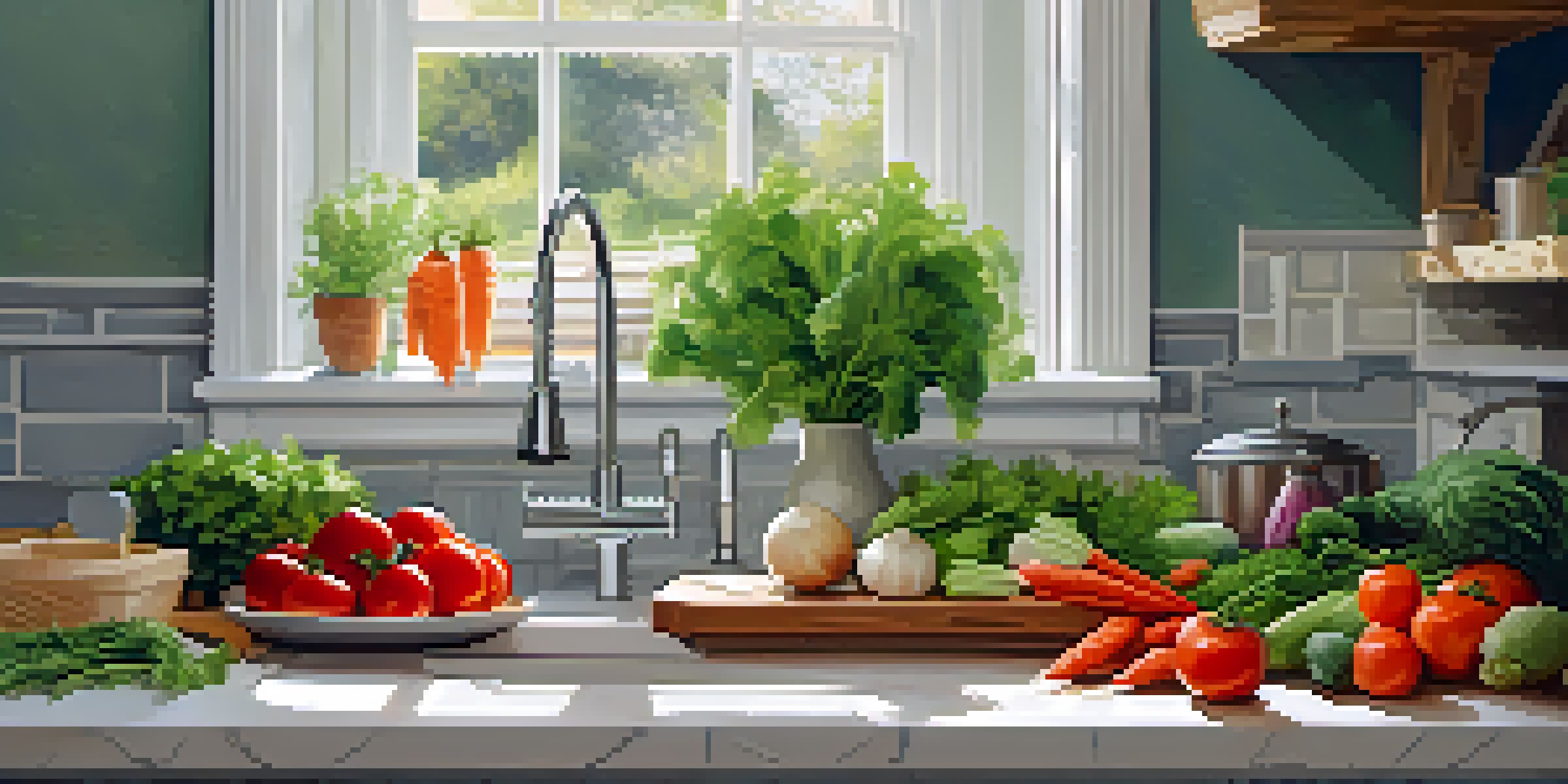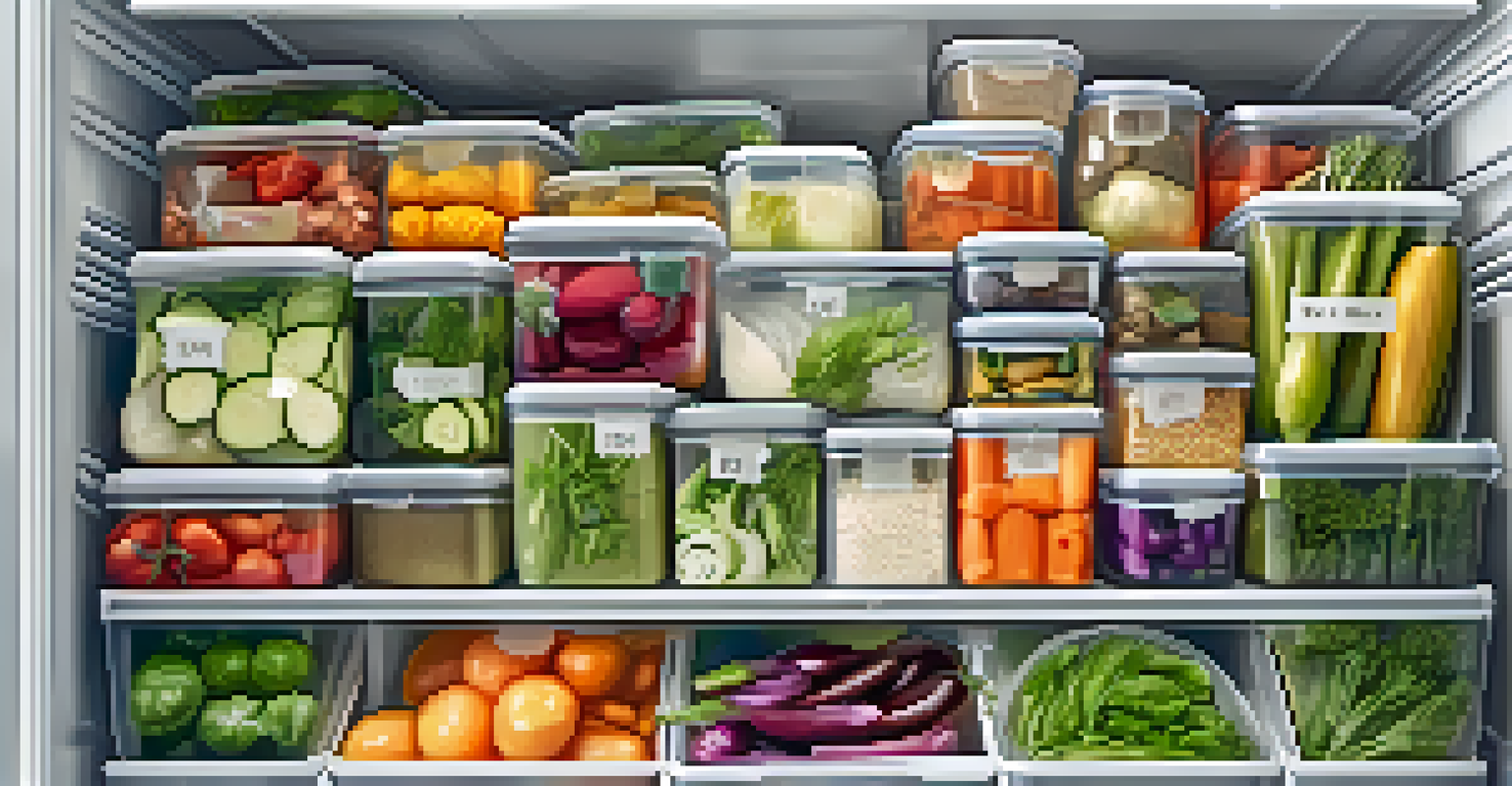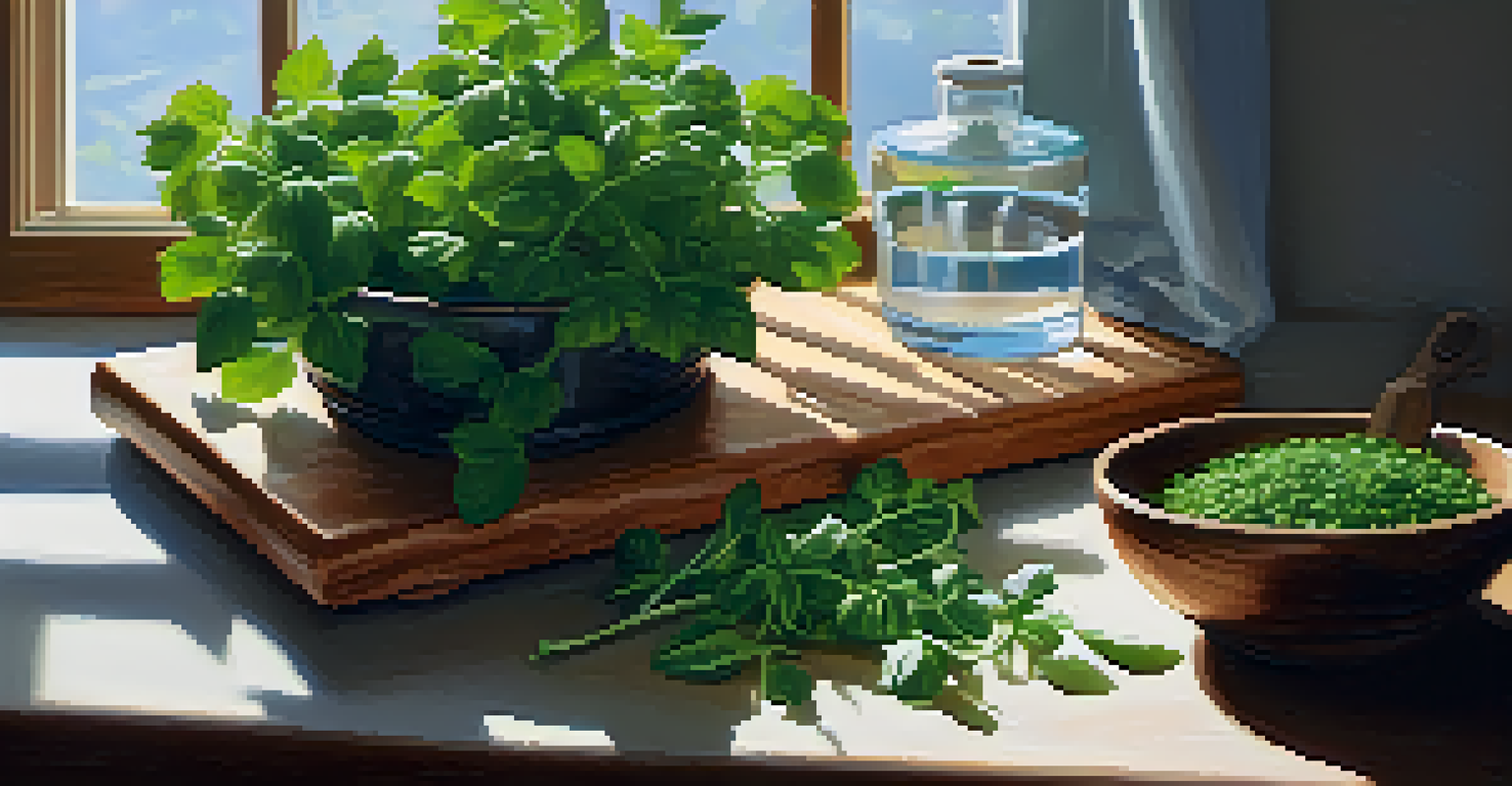How to Properly Clean and Store Vegetarian Ingredients

Understanding the Importance of Cleaning Veggies
Cleaning your vegetables is crucial for removing dirt, pesticides, and bacteria. Imagine biting into a fresh salad only to discover gritty soil—definitely not appetizing! By properly washing your ingredients, you're not just enhancing flavor; you're also protecting your health.
Cleaning vegetables is not just about making them look good; it's about making them safe to eat.
Start by rinsing your vegetables under cold running water. For leafy greens, you might want to soak them briefly in a bowl of water to loosen any stubborn dirt. Using a soft brush can also help scrub away any residues on root vegetables like potatoes or carrots.
Remember, not all vegetables need the same treatment. For instance, delicate produce like berries should be rinsed gently to avoid bruising, while sturdier items can handle a bit more scrubbing. Tailoring your cleaning method ensures that all your ingredients stay fresh and flavorful.
Best Practices for Storing Fresh Vegetables
Storing your cleaned vegetables properly can extend their freshness and prevent spoilage. Think of your fridge as a little garden—each drawer can be a home for different veggies based on their needs! For instance, leafy greens prefer the crisper drawer, while root vegetables do better in a cool, dark place.

Use breathable bags or containers to allow air circulation, which helps keep moisture levels in check. Avoid washing your greens until you're ready to use them, as excess moisture can lead to quicker decay. A simple paper towel can absorb any lingering dampness before sealing them away.
Importance of Cleaning Veggies
Properly washing vegetables removes dirt and bacteria, enhancing flavor and protecting health.
Labeling your containers with dates can also be a handy trick. This way, you can keep track of when you bought or cleaned your vegetables, ensuring you use them at their peak freshness. A little organization goes a long way in reducing waste!
Cleaning and Storing Herbs for Maximum Flavor
Herbs can elevate any dish, but they require special care to maintain their vibrant flavor. When cleaning herbs, a gentle rinse under cold water is usually sufficient. However, delicate herbs like basil should be treated with extra care to avoid bruising their leaves.
A clean kitchen is a happy kitchen.
After washing, gently pat your herbs dry with a clean towel or let them air dry on a paper towel. Storing them in a glass of water (like flowers) can keep them fresh longer, especially for herbs like parsley and cilantro. Just cover them loosely with a plastic bag to retain moisture.
For longer storage, consider freezing herbs in ice cube trays with olive oil or water. This method preserves their flavor and makes it easy to add a burst of freshness to your dishes later. It's a win-win situation for flavor enthusiasts!
The Right Way to Clean and Store Grains and Legumes
Grains and legumes are pantry staples that require proper cleaning before cooking. Rinse lentils and quinoa under cold water to remove any dust or debris. This simple step ensures that your meals not only taste better but are also safe to eat.
After rinsing, allow them to drain well before cooking. For storage, keep grains in airtight containers in a cool, dark place to prevent them from going stale. Using glass or BPA-free plastic containers can help maintain their integrity over time.
Storing Food for Freshness
Organizing and storing cleaned vegetables and ingredients correctly can extend their freshness and reduce waste.
Labeling your containers with purchase dates is also a good practice, as it helps you keep track of freshness. Most grains and legumes last a long time, but knowing when they were bought will remind you to use them in a timely manner.
Cleaning and Storing Nuts and Seeds Safely
Nuts and seeds are packed with nutrients but can turn rancid if not stored properly. While you don’t need to wash them, checking for any debris or shells is a good idea. A quick visual inspection can save you from an unpleasant surprise while snacking.
To keep them fresh, store nuts and seeds in airtight containers in the refrigerator or freezer. This helps prevent oxidation and keeps them crunchy for longer. It’s like giving them a cozy home that protects their flavors and textures.
For those who buy in bulk, dividing them into smaller portions can help manage freshness. By taking out only what you need, you minimize the chances of the entire batch going stale. Plus, it's a great way to avoid waste!
Storing Canned and Packaged Vegetarian Ingredients
Canned and packaged vegetarian ingredients can be lifesavers for quick meals, but they also require proper storage. Always check the expiration dates and ensure that the cans are not dented or damaged, as this can compromise their safety.
Store unopened cans in a cool, dry place, away from direct sunlight. Once opened, transfer any leftovers to a glass or plastic container and refrigerate them. This helps maintain their quality and prevents any off-flavors from developing.
Herbs and Grains Require Care
Cleaning and storing herbs, grains, and legumes properly maximizes their flavor and shelf life.
Remember to label your containers with the date they were opened. This simple practice will remind you to use them within a few days, ensuring that you enjoy their flavors at their best without any waste.
Using Containers for Efficient Food Storage
Choosing the right storage containers can make a world of difference in preserving your vegetarian ingredients. Opt for BPA-free plastic or glass containers with airtight seals to keep moisture and air out. This not only helps keep your food fresh but also protects it from odors in the fridge.
Consider using stackable containers to save space in your pantry or fridge. This organization hack not only makes it easier to find what you need but also maximizes your storage areas. Plus, it looks tidier and more inviting!

Don't forget about labeling your containers. A simple label with the contents and date can save you time and prevent any confusion. It’s a small effort that pays off in maintaining a well-organized kitchen!
Embracing a Clean Kitchen for Vegetarian Cooking
A clean kitchen is the heart of successful vegetarian cooking. Keeping your workspace tidy not only makes it more enjoyable to cook but also helps prevent cross-contamination. Regularly wipe down surfaces and sanitize cutting boards, especially after handling raw ingredients.
Implementing a routine for cleaning as you go can save you time later. For instance, rinsing your vegetables while waiting for water to boil can streamline your cooking process. This habit not only keeps your kitchen organized but also enhances your efficiency.
Lastly, remember that a clean kitchen reflects your love for cooking. It sets a positive tone for meal preparation, making it a delightful experience, whether you're whipping up a simple salad or an elaborate feast!